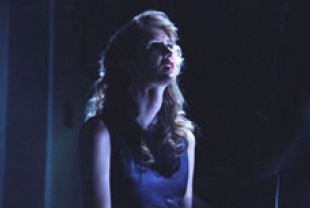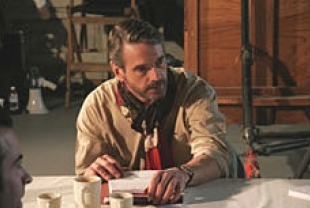The first words in David Lynch's film are "The strairway is dark." We know the feeling. So much of the way is unlit, and we stumble on each step. It would all be so nice if everything were clearly illuminated, and we could see what lies ahead.
"Where are we?" That's a good question and one that usually passes through our minds while watching a film by this director. Most times when we go to the movies, things are laid out for us in an easy-to-comprehend pattern. We can relate to the settings, and the characters only rarely really surprise us. There is a bit of comfort in all of this and we enjoy that — even expect that. Then along comes David Lynch and his propensity to put his characters in strange and baffling situations. Is this woman wandering up the stairs or is it a dream she is having about being in the dark? Either way we feel uncomfortable. So where are we?
We know this for sure. Nikki (Laura Dern) is a wealthy and famous actress who lives with her domineering and possessive husband (Peter J. Lucas) in a gigantic Hollywood house. A neighbor (Grace Zabriskie) with a European accent turns up one day and tells her a nasty little parable of how evil was set loose on the world. She reveals some secrets about the film Nikki hopes to star in and has a weird concept of time. Her menacing demeanor rocks the actress but that all vanishes in a second when she learns from her agent that she has been chosen for the lead role in the film.
Kingsley (Jeremy Irons), the director, is quite sure that Nikki will rise to the occasion and give a great performance. Her co-star is Devon (Justin Theroux), a womanizer, who is warned by his handlers to keep his hands off her. Freddie (Harry Dean Stanton), Kingsley's assistant, has some shocking news about the film. It is not an original screenplay but a remake of an old movie based on a Polish gypsy folktale that was never finished because its two stars were murdered. While Nikki and Devon wrap their heads around this shocking news, Freddie tries to sponge some money off them. He does this to other cast members as well. This grisly and macabre tale really gets to Nikki and when she has sex with Devon, he calls her Sue and she calls him Billy. So begins a long ride as the actress finds herself identifying with her film character.
This digitally shot movie by David Lynch runs three hours. Only the most adventurous movie-goer will want to take the trip. The director, according to the press notes, is a devotee of Transcendental Meditation and has established a foundation for Consciousness-Based Education and World Peace. He wants us to slow down and in this movie, he forces us to give up any idea we might have about roaring through the story in the express lane. Lynch doesn't rush to explain anything. Can you live with that?
Not if you've told yourself a story that movies shouldn't be more than 120 minutes. Not if you've told yourself a story that there has to be a logical reason why the movie contains several sequences with three characters in rabbit outfits saying lines that are greeted by laughter on a soundtrack. Not if you've told yourself a story that dramas shouldn't have characters breaking into song, such as the prostitutes singing "The Locomotion." Slow down, and give up the stories you have told yourself about the way movies ought to be. Savor the rabbits for their own sake. Several characters in the film make references to having a special place in their hearts for animals. Maybe that's all their presence means.
Inland Empire will appeal to those spiritual souls who can adopt the mantra recommended by Korean Zen Master Seung Sahn: "Don't know." When you find yourself trying to figure it out, repeat "Don't know. Don't know. Don't know." There are so many mysteries in our universe. We need to give up the illusion that we can make sense out of it all. Lynch's movies remind us that we can't, no matter how hard we try.
How about the mystery of love? That is one of the main themes in Inland Empire. Just go with the flow and see where it takes you. How about the mystery of time? Another staple in the Lynch's movies. Past, present or future are all connected; does it really matter which one you are in? And how do you deal with these magic moments? Are you enslaved to one and driven crazy by the other? You can tell by the number of times you check your watch.
Then there is the mystery of the stories we tell ourselves. Nikki hears a story about fear and violence and finds herself in a mind trip introducing her to both. If there is a message here (and thinking that there needs to be is yet another story), it could be that we ought to be careful what we tell ourselves because it just might manifest.

